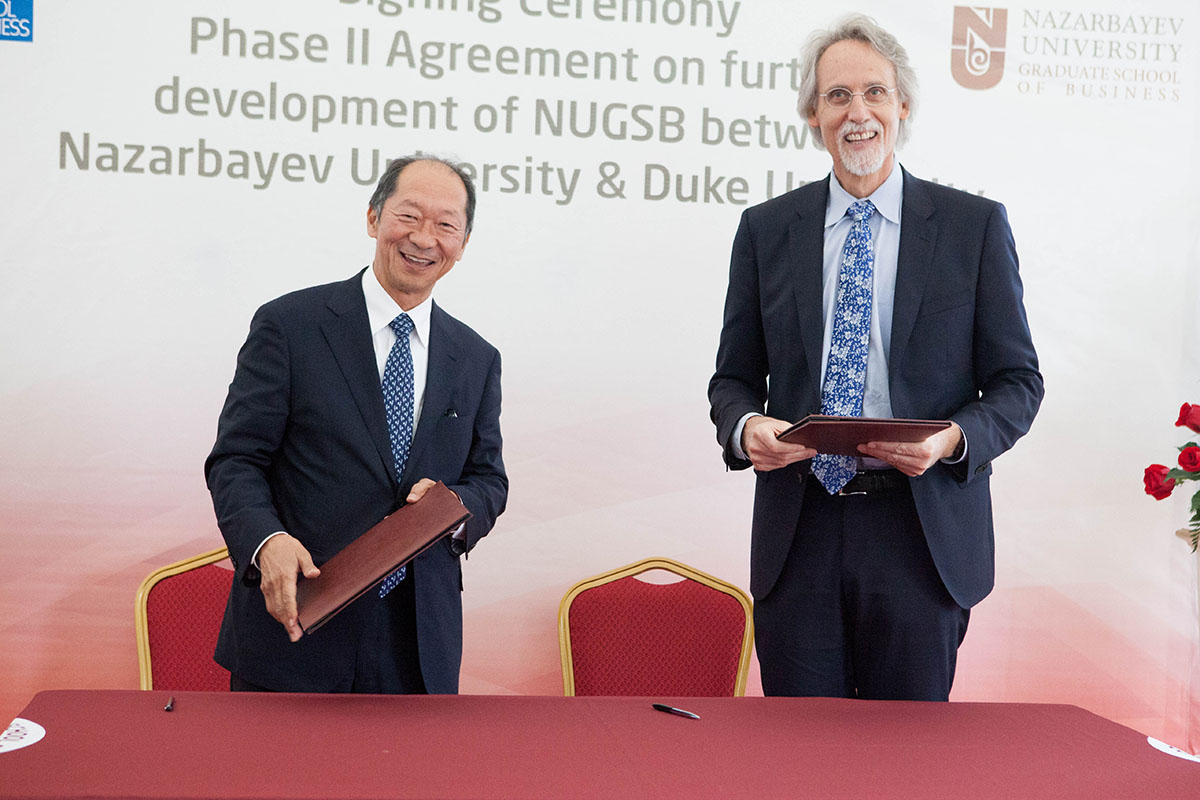EMEA / Kazakhstan
From the beginning: How Duke's Fuqua School of Business helped launch a school in Kazakhstan
From the beginning: How Duke's Fuqua School of Business helped launch a school in Kazakhstan

This post can be read in Russian here.
Вы можете прочитать этот пост на русском здесь.
By Robert Olinger, Director of Business Development, Kazakhstan
Recently, I sat in the audience and watched the first graduates walk across the stage after earning their MBAs from Kazakhstan’s Nazarbayev University (NU). I felt tremendous pride during this occasion. It’s rare to play a role in building a new university, to be there at its inception, and then to see the first degrees conferred. The event provided an opportunity to reflect on this unique and successful collaboration.
In 2011, I joined a very small team at Duke University’s Fuqua School of Business tasked with advising Nazarbayev University on building a top-tier business school in Astana, Kazakhstan. The collaboration has proved mutually beneficial for both schools. We have offered our expertise and experience in setting up a business school: hiring a faculty, marketing, recruitment and admissions, and creating a unique and meaningful student experience. In turn, we have been introduced to the largest economy in a region that is increasingly an important part of the world economy.
Engagement in this region has always been important to Fuqua. We were the first business school to collaborate with the Soviet Union on a management training program, and we have retained strong connections with the region ever since. As our dean, Bill Boulding, shared in a 2011 news release about the collaboration:
“As a business school, we want to be both embedded and connected. Embedded entails understanding the key needs of a region and serving it to make a positive difference. Connected means that as we bring the appropriate intellectual resources to serve the needs of a region, we consequently better understand how the world works.
“Our collaboration with Nazarbayev University personifies these two principles. This is an ideal opportunity to further the exchange of ideas via civil discourse, promote stability within the region, build appropriate economic infrastructure and create a base for sustainable economic development in Kazakhstan and Central Asia for years to come.”
The relationship with Nazarbayev University began 2009, just as ground was broken on what would become the school, then called the New University of Astana. At an alumni event in Kazakhstan, a representative of the university approached Dan Nagy, then our regional director for the CIS region, to see if we would collaborate with the Minister of Education in developing a new business school in Kazakhstan.
As all academic relationships start, it did so slowly, first with a small delegation of faculty visiting the region and assessing the demand and need for high-quality business education. Next, we worked closely with NU to develop a framework for the school, a portfolio of MBA programs, and basic operating principals. Last, we really dug in, assisting the school in launching two MBA programs, building a state of the art business school facility, hiring faculty, and having our own teach in its programs. The agreement between the two schools is a consulting arrangement. While our faculty continue teaching in the program, NU will grant its own degrees, not Duke or joint degrees.
As we share best practices with our colleagues in Kazakhstan, we have also expanded our business network in a unique country, learned the economic landscape, the business processes, and the key influencers in the region. With this knowledge and connection, we can introduce our students to an ambitious country in a way that was impossible several years ago. To that end, we are excited that students in our Global Executive MBA program will visit Kazakhstan this summer to study in the region.
While Kazakhstan is known for its high level of bureaucracy (a Soviet legacy), and high dependence on oil and natural resources, we believe our students will be surprised to find a young and highly educated ambitious population, dedicated to increasing the level of entrepreneurship in industries outside natural resources, and a strong desire to meet international standards. The city of Astana demonstrates the aspirations of the country, with a gestalt of modern architecture and billions of dollars of infrastructure work in progress as it prepares for hosting the EXPO 2017. It is a unique cityscape that perfectly matches the spirit of the country.
As our collaboration continues, I feel proud that Fuqua has embarked on this journey with NU. This is not a risk-free venture, it is not easy, and it is not something just any business school would engage in. It is a transformational opportunity that requires collaboration between two very different institutions to reach a shared outcome. There are different paths to this outcome, and navigating the journey is challenging. However, our school is open to the challenge, and to learn alongside NU. In the end, I believe both parties be equally enriched and enlightened.
